八上unit1 topic1 section A
- 格式:ppt
- 大小:1.75 MB
- 文档页数:31
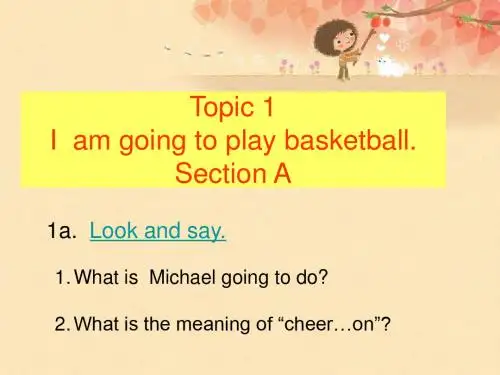
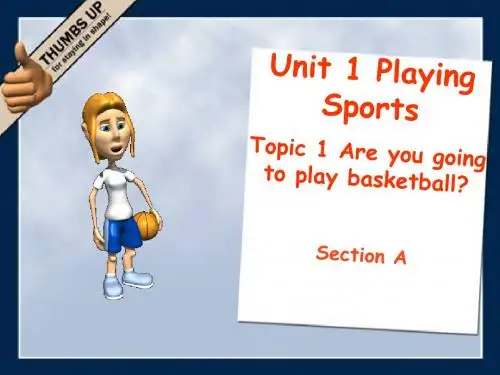
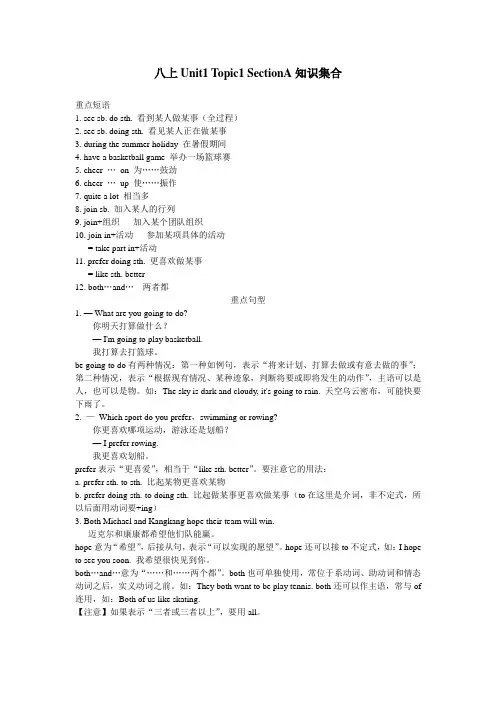
八上Unit1 Topic1 SectionA知识集合重点短语1. see sb. do sth. 看到某人做某事(全过程)2. see sb. doing sth. 看见某人正在做某事3. during the summer holiday 在暑假期间4. have a basketball game 举办一场篮球赛5. cheer …on 为……鼓劲6. cheer …up 使……振作7. quite a lot 相当多8. join sb. 加入某人的行列9. join+组织加入某个团队组织10. join in+活动参加某项具体的活动= take part in+活动11. prefer doing sth. 更喜欢做某事= like sth. better12. both…and…两者都重点句型1. — What are you going to do?你明天打算做什么?— I'm going to play basketball.我打算去打篮球。
be going to do有两种情况:第一种如例句,表示“将来计划、打算去做或有意去做的事”;第二种情况,表示“根据现有情况、某种迹象,判断将要或即将发生的动作”,主语可以是人,也可以是物。
如:The sky is dark and cloudy, it's going to rain. 天空乌云密布,可能快要下雨了。
2. —Which sport do you prefer,swimming or rowing?你更喜欢哪项运动,游泳还是划船?— I prefer rowing.我更喜欢划船。
prefer表示“更喜爱”,相当于“like sth. better”。
要注意它的用法:a. prefer sth. to sth. 比起某物更喜欢某物b. prefer doing sth. to doing sth. 比起做某事更喜欢做某事(to在这里是介词,非不定式,所以后面用动词要+ing)3. Both Michael and Kangkang hope their team will win.迈克尔和康康都希望他们队能赢。
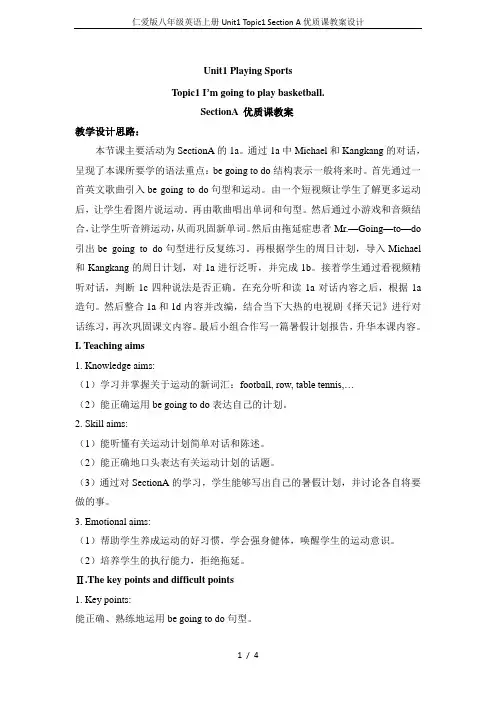
Unit1 Playing SportsTopic1 I’m going to play basketball.SectionA 优质课教案教学设计思路:本节课主要活动为SectionA的1a。
通过1a中Michael和Kangkang的对话,呈现了本课所要学的语法重点:be going to do结构表示一般将来时。
首先通过一首英文歌曲引入be going to do句型和运动。
由一个短视频让学生了解更多运动后,让学生看图片说运动。
再由歌曲唱出单词和句型。
然后通过小游戏和音频结合,让学生听音辨运动,从而巩固新单词。
然后由拖延症患者Mr.—Going—to—do 引出be going to do句型进行反复练习。
再根据学生的周日计划,导入Michael 和Kangkang的周日计划,对1a进行泛听,并完成1b。
接着学生通过看视频精听对话,判断1c四种说法是否正确。
在充分听和读1a对话内容之后,根据1a 造句。
然后整合1a和1d内容并改编,结合当下大热的电视剧《择天记》进行对话练习,再次巩固课文内容。
最后小组合作写一篇暑假计划报告,升华本课内容。
I. Teaching aims1. Knowledge aims:(1)学习并掌握关于运动的新词汇:football, row, table tennis,…(2)能正确运用be going to do表达自己的计划。
2. Skill aims:(1)能听懂有关运动计划简单对话和陈述。
(2)能正确地口头表达有关运动计划的话题。
(3)通过对SectionA的学习,学生能够写出自己的暑假计划,并讨论各自将要做的事。
3. Emotional aims:(1)帮助学生养成运动的好习惯,学会强身健体,唤醒学生的运动意识。
(2)培养学生的执行能力,拒绝拖延。
Ⅱ.The key points and difficult points1. Key points:能正确、熟练地运用be going to do句型。

Unit1 Topic1 Section A语法:含有be going to +V原的一般将来时(P126)1.你将要去做什么?我将要去打篮球.2.喜欢做某事(经常性地)3.see的过去式saw看见某人经常做某事/做过了某事看见某人正在做某事,强调动作正在进行4.在暑假期间5.举办一场对抗3班的篮球赛against反对;倚着,靠着;撞到;映衬6.在星期天时间介词in, on, at 的用法:年月季节早晚in,at午夜时与分,具体某日上下午,星期日期全用on.7.我希望我们的队伍将会赢。
我也是.8.你愿意来为我们加油吗?当然,我愿意.为某人加油( sb是宾格, 因为跟在动词后)9. 你更喜欢哪一种运动,A or B ?prefer的用法:prefer + 名词= like +名词+ better如:I prefer apples = I like apples better prefer doing sth to doing sth 更喜欢做某事胜过做某事10.你划船多吗? 是的,非常多/ 不,很少。
(P2)11.你打算加入学校划船队吗?是的。
/不,我打算………(P2)13.区分:参加,加入(1)加入人或组织用:(2 ) 参加某项活动3个Unit1 Topic1 Section B1.你最喜欢什么运动?2.你最喜欢的运动员是谁?3.你知道关于他的一些事吗?4.他多高?他2.26米高。
(数词+名词+形容词)5.为…效力与…比赛和…玩6.我打算成为像他一样的篮球运动员。
7.那是我的梦想。
8.你长大后想当什么?我打算成为一名科学家。
(when引导时间状语从句,主将从现)What is he going to be when he grows up?9.在今后Unit1 Topic1 Section C1.非常喜欢2.骑自行车3.四“花费”①spend的两个词组(spend--spent)主语为人②pay for (pay--paid) 主语为人③cost (cost--cost)主语为物④take:It takes sb. some time to do sth. 主语为形式主语it4.爬山5.在体育馆6.擅长…7.学校运动会8.跳高9.跳远10.确信,确定(2个)①确定做某事be sure to do sth②对某事确定,有把握be sure of / about sth③be sure+that从句④be not sure+if / whether 从句11.There be句型的一般将来时结构:(there be中不能出现实义动词have)将有(2个)12.使某人/某物保持某种状态13.使某人做某事14.受…欢迎15.对什么有益反义词组16.全世界17.保持健康18.做某事的一个好方法19.她每天都在体育馆花费半小时锻炼。
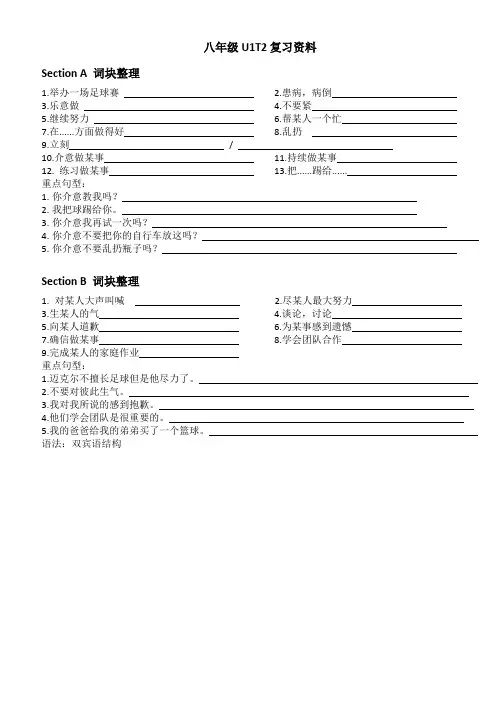
八年级U1T2复习资料Section A 词块整理1.举办一场足球赛2.患病,病倒3.乐意做4.不要紧5.继续努力6.帮某人一个忙7.在......方面做得好8.乱扔9.立刻/10.介意做某事11.持续做某事12. 练习做某事13.把......踢给......重点句型:1.你介意教我吗?2.我把球踢给你。
3.你介意我再试一次吗?4.你介意不要把你的自行车放这吗?5.你介意不要乱扔瓶子吗?Section B 词块整理1.对某人大声叫喊2.尽某人最大努力3.生某人的气4.谈论,讨论5.向某人道歉6.为某事感到遗憾7.确信做某事8.学会团队合作9.完成某人的家庭作业重点句型:1.迈克尔不擅长足球但是他尽力了。
2.不要对彼此生气。
3.我对我所说的感到抱歉。
4.他们学会团队是很重要的。
5.我的爸爸给我的弟弟买了一个篮球。
语法:双宾语结构Section C 词块整理1.最受欢迎的运动之一2.起先3.在恶劣的天气里4.有......的历史5.形成,产生6.阻止某人做某事7.遵守规则8.例如9.越来越流行10.后天11.全世界/12.做某事对某人来说很重要本节词义转换:play→player invent→inventor→invention本节词义辨析:a number of/the number of重点句型:1.篮球是美国最受欢迎的运动之一。
2.有一个世纪的历史。
3.对你和其他选手来说作为一个团体很重要。
4.篮球在全世界变得越来越流行。
Section D 词块整理1.仅仅为了娱乐2.使......变成3.围......坐4.享受阳光本节词义辨析:other/another/the other/others语法:双宾语结构一般将来时时:will do sth. (中考必考)八年级U1T2复习资料答案Section A 词块整理1.举办一场足球赛have a soccer game2.患病,病倒fell ill/be ill3.乐意做be glad to do sth.4.不要紧Not at all.5.继续努力keep trying6.帮某人一个忙give sb. a hand7.在......方面做得好do well in/be good at 8.乱扔throw sth. around9.立刻at once / right away10.介意做某事mind doing sth. 11.持续做某事keep/go on doing12. 练习做某事practice doing sth. 13.把......踢给......kick sth.to sth.重点句型:1.你介意教我吗?Would you mind teaching me?2.我把球踢给你。
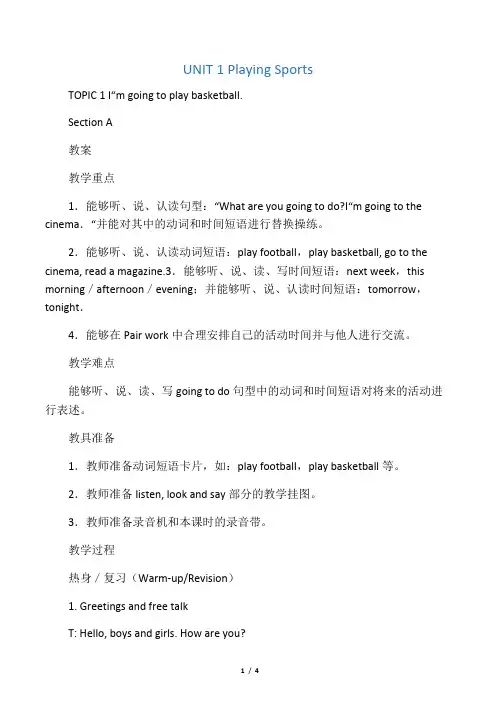
UNIT 1 Playing SportsTOPIC 1 I“m going to play basketball.Section A教案教学重点1.能够听、说、认读句型:“What are you going to do?I“m going to the cinema.“并能对其中的动词和时间短语进行替换操练。
2.能够听、说、认读动词短语:play football,play basketball, go to the cinema, read a magazine.3.能够听、说、读、写时间短语:next week,this morning/afternoon/evening;并能够听、说、认读时间短语:tomorrow,tonight.4.能够在Pair work中合理安排自己的活动时间并与他人进行交流。
教学难点能够听、说、读、写going to do句型中的动词和时间短语对将来的活动进行表述。
教具准备1.教师准备动词短语卡片,如:play football,play basketball等。
2.教师准备listen, look and say部分的教学挂图。
3.教师准备录音机和本课时的录音带。
教学过程热身/复习(Warm-up/Revision)1. Greetings and free talkT: Hello, boys and girls. How are you?S: Hello, Miss. I’m fine, thank you, and you?T: I’m fine, too. Thank you very much.(Say hello to the teachers together)教师课前放歌曲“What Are You Going to Do?“学生初步感知be going to do句型。
师生进行日常会话,可将重点放在动词短语的问答上,如:T:What day is it today ?S:It“s Tuesday.T:What day is it tomorrow ?S:It“s Wednesday.T:What do you usually do On Wednesdays/in the evening?S:I usually read books.呈现新课1. Lead in(1)学生朗读书本段落进行学习。
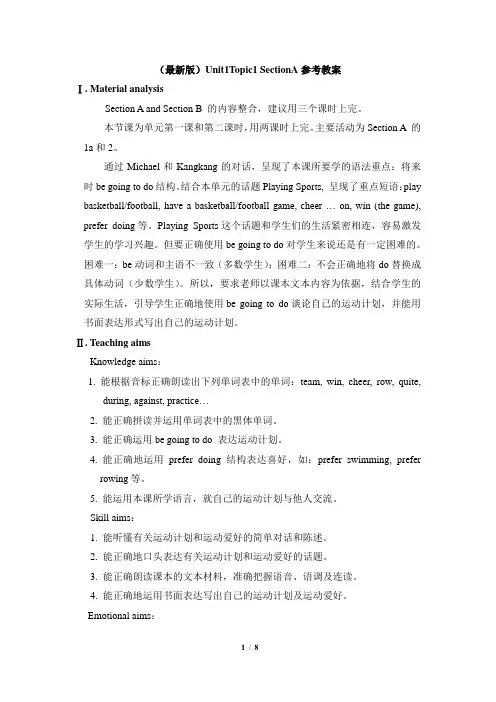
(最新版)Unit1Topic1 SectionA参考教案Ⅰ. Material analysisSection A and Section B 的内容整合,建议用三个课时上完。
本节课为单元第一课和第二课时,用两课时上完。
主要活动为Section A 的1a和2。
通过Michael和Kangkang的对话,呈现了本课所要学的语法重点:将来时be going to do结构。
结合本单元的话题Playing Sports, 呈现了重点短语:play basketball/football, have a ba sketball/football game, cheer … on, win (the game), prefer doing等。
Playing Sports这个话题和学生们的生活紧密相连,容易激发学生的学习兴趣。
但要正确使用be going to do对学生来说还是有一定困难的。
困难一:be动词和主语不一致(多数学生);困难二:不会正确地将do替换成具体动词(少数学生)。
所以,要求老师以课本文本内容为依据,结合学生的实际生活,引导学生正确地使用be going to do谈论自己的运动计划,并能用书面表达形式写出自己的运动计划。
Ⅱ. Teaching aimsKnowledge aims:1. 能根据音标正确朗读出下列单词表中的单词:team, win, cheer, row, quite,during, against, practice…2. 能正确拼读并运用单词表中的黑体单词。
3. 能正确运用be going to do 表达运动计划。
4. 能正确地运用prefer doing结构表达喜好,如:prefer swimming, preferrowing等。
5. 能运用本课所学语言,就自己的运动计划与他人交流。
Skill aims:1. 能听懂有关运动计划和运动爱好的简单对话和陈述。
2. 能正确地口头表达有关运动计划和运动爱好的话题。
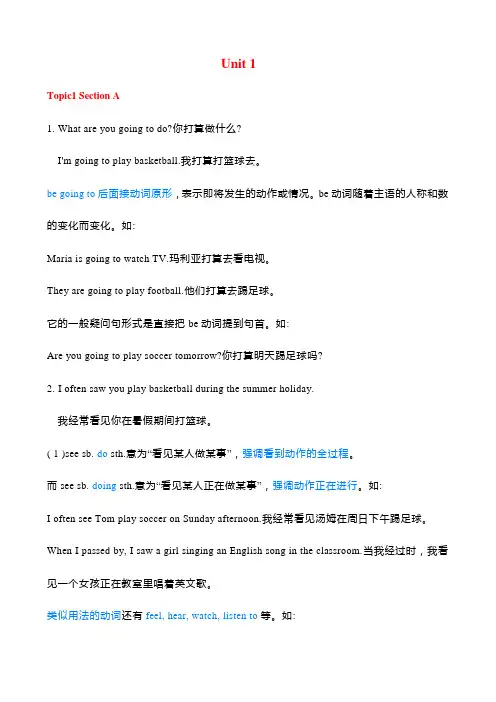
Unit 1Topic1 Section A1. What are you going to do?你打算做什么?I'm going to play basketball.我打算打篮球去。
be going to后面接动词原形,表示即将发生的动作或情况。
be动词随着主语的人称和数的变化而变化。
如:Maria is going to watch TV.玛利亚打算去看电视。
They are going to play football.他们打算去踢足球。
它的一般疑问句形式是直接把be动词提到句首。
如:Are you going to play soccer tomorrow?你打算明天踢足球吗?2. I often saw you play basketball during the summer holiday.我经常看见你在暑假期间打篮球。
( 1 )see sb. do sth.意为“看见某人做某事”,强调看到动作的全过程。
而see sb. doing sth.意为“看见某人正在做某事”,强调动作正在进行。
如:I often see Tom play soccer on Sunday afternoon.我经常看见汤姆在周日下午踢足球。
When I passed by, I saw a girl singing an English song in the classroom.当我经过时,我看见一个女孩正在教室里唱着英文歌。
类似用法的动词还有feel, hear, watch, listen to等。
如:I often hear Ann play the piano after school.放学后,我经常听到安弹钢琴。
Look! Mr. Zhang is watching his son swimming.看!张先生正在看着他儿子游泳。
(2) during the summer holiday意为“在暑假期间”。
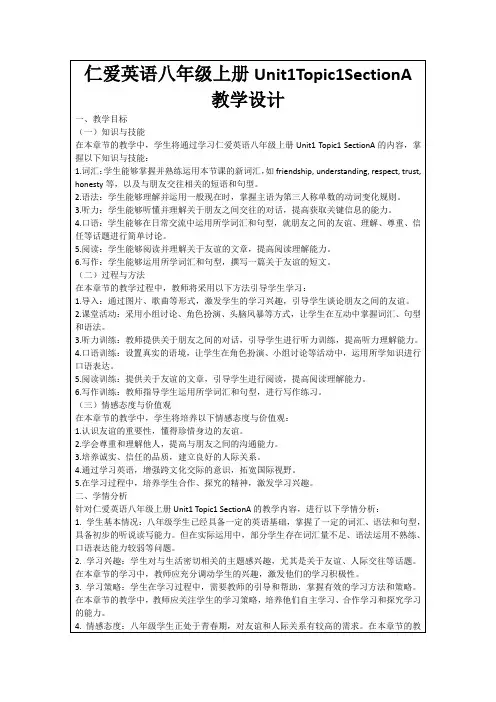
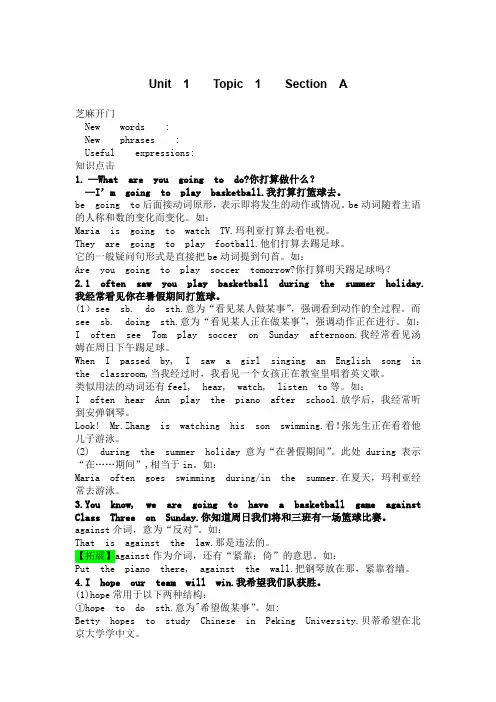
Unit 1 Topic 1 Section A芝麻开门New words :New phrases :Useful expressions:知识点击1.—What are you going to do?你打算做什么?—I’m going to play basketball.我打算打篮球去。
be going to后面接动词原形,表示即将发生的动作或情况。
be动词随着主语的人称和数的变化而变化。
如:Maria is going to watch TV.玛利亚打算去看电视。
They are going to play football.他们打算去踢足球。
它的一般疑问句形式是直接把be动词提到句首。
如:Are you going to play soccer tomorrow?你打算明天踢足球吗?2.1 often saw you play basketball during the summer holiday.我经常看见你在暑假期间打篮球。
(1)see sb. do sth.意为“看见某人做某事”,强调看到动作的全过程。
而see sb. doing sth.意为“看见某人正在做某事”,强调动作正在进行。
如:I often see Tom play soccer on Sunday afternoon.我经常看见汤姆在周日下午踢足球。
When I passed by, I saw a girl singing an English song in the classroom,当我经过时,我看见一个女孩正在教室里唱着英文歌。
类似用法的动词还有feel, hear, watch, listen to等。
如:I often hear Ann play the piano after school.放学后,我经常听到安弹钢琴。
Look! Mr.Zhang is watching his son swimming.看!张先生正在看着他儿子游泳。
八年级上册U n i t1T o p i c1S e c t i o n A一.单选题()1.-Look! Our classmates are having a basketball game over there.-Let’s .A. cheer him onB. cheer on himC. cheer them onD. cheer on them ()2. Class Three is going to have a basketball game Class Four tomorrow.A. forB. withC. againstD. between()3. Mike plays basketball very well. He playing it every afternoon.A. enjoysB. practicesC. keepsD. prefers()4. Li Hua studies hard. You can often see him books in the library.A. readB. readsC. readingD. to read()5. – Do you play sports much after school? -Yes. I play soccer .A. very muchB. quite a lotC. quite a fewD. just a little()6. I going to the park, and he going to the zoo this Sunday.A. am, amB. is, isC. am, isD. is , am()7. Li Lei bananas apples when he was a child.A. prefers, toB. prefer , toC. preferred , betterD. preferred, to()8. I hope my good friend to the party.A. will comeB. comeC. comesD. came二.句型转换1. Which sport do you prefer, swimming or cycling?(同义句转换)Which sport do you , swimming or cycling?2. My parents are both doctors. (同义句转换)my mother my father are doctors.3. They are going to have a class meet this afternoon. (改为一般疑问句,并作否定回答)to have a class meet this afternoon?, .4. My grandpa goes fishing every Sunday.(用next Sunday替换every Sunday)1) My grandpa next Sunday2) My grandpa next Sunday5. David is going to row a boat tomorrow.David tomorrow? 三.用括号内所给单词的适当形式填空1. My brother prefers (play) basketball. I prefer football.2. I see you (read) English every day.3.- Is Henry going to ( join) the swimming team?-Sorry, I don’t know.4. (swim) is her favorite sport.5. We are very happy, because our team (won) the last game.四.根据句意写单词1. Tom often plays tennis the summer holidays.2.- How many players are there in a football ?3.- Sally (希望) her mother to buy her a guitar ten years ago.4.-Listen! Can you hear someone ( 唱歌) in the gym?Unit 1 Topic 1 SectionB一.单词1. My is to be a singer like Liu Huan.2.-What are you going to do in the ? -I am going to be a teacher.3. Yao Ming is one of the best basketball in the world.4. My aunts work in the police station, and they are .5. Maria wants to be a like Edison.6. He likes music, and he wants to be a .二.单项选择( )1. My daughter is going to be a teacher when she .A. growB. g rewC. grows upD. grew up( )2.Lin Shuhao plays the Houston Rockets in America.A. toB. forC. atD. on( )3. Mike wants to be actor like Jackie Chan.A. aB. anC. theD. /( )4. –Would you like to come to see the football match with me? - .A. That’s rightB. Sure, I’d love toC. Yes, I am.D. Thank you ( )5. My sister wants to buy a new dress. She it to the party.A. wearsB. wearC. woreD. is going to wear( )6. -Did you know the accident?A. something aboutB. anything aboutC. something forD. anything for 三.对话理解,有一项是多余的。
八年级英语(学科)集体备课教学设计【教学过程】Step 1 Pre-listening1.Warming-up: Let’s enjoy a video and get ready to talk about sports.2.learn some sports3.Make up conversations with your partner by using the following sentences.Step 2 While-listening1.3a What are Bob and Sally going to do?Listen to the conversation and complete the table.2.1b Listen to 1a and choose the correct answer.3.Listen and mark T (True) or F (False).Step 3 Post-listening1.Watch and follow2.Role Play: Practice the dialog with your partner, and act itout!3.Read 1a and fill in the blanks.nguage Points①prefer最常见的意思是"宁可"、"宁愿(选择)"、"比较喜欢"、"更喜欢"等,可以构成以下结构:prefer +n./v.-ing/to do sth. 更喜欢......e.g. Do you prefer coffee or tea? 你更喜欢咖啡还是茶? I prefer tea.Do you prefer watching TV or reading? I prefer reading. prefer A to B 比起B来更喜欢Ae.g. I prefer apples to oranges.prefer doing A to doing B 比起做B事更喜欢做A事e.g. I prefer running to swimming.比起游泳我更喜欢跑步。
仁爱英语八年级上册Unit 1 topic 1Section A语言点讲解1.I saw you play basketball almost every day during the Summer holidays.常见的感官动词有:see, watch, hear, smell, feel 等。
后可接①动词ing形式,表此动作正在发生。
②动词原形,不表此动作正在发生, 表此动作已完成或存在的事实。
① Do you smell something ? (burn) 答案:burning② I often see him basketball after class. ( play ) 答案:play2.There is going to be a basketball game between Class Three and our class this Sunday.There be 句型:表某地有某物. 而have 表示某人有…(1)There is/ are..表现在某地有某物,is/are取决于后面的名词是单数还是复数,单数用is 复数用are,如①There is a pen and two rulers on the desk.②There are two rulers and a pen…(2) There was/were…表过去某地有某物。
was/were的用法也遵循就近原则。
(3)There will be 或There is/are going to be 表某地将有某事物。
不能说成There willhave…(题) a match in our school between Class Three and Class Four next week.3.Would you like to come and cheer us on? ----- Sure, I’d love to.(1)Would you like + 不定式?表建议或邀请。